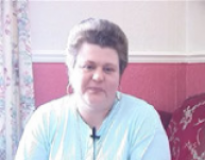Interview EP05

Age at interview: 30
Age at diagnosis: 9
Brief Outline: Diagnosed with epilepsy in 1981. Tried various drugs and, in 1999, had neurosurgery which reduced the frequency and intensity of seizures. Current medication' gabapentin (Neurontin) and carbamazepine retard (Tegretol Retard) daily, and clobazam (Frisium) around the time of menstruation.
Background: Not employed at time of interview; divorced, 1 child.
More about me...
Explains that a brain tumour was found during surgery and her reasons for having the operation.
Explains that a brain tumour was found during surgery and her reasons for having the operation.
SHOW TEXT VERSION
PRINT TRANSCRIPT
They did actually say to me that there was a risk. I took the risk still because I believed it could improve my life and if not for me for my daughter, because at one stage I wouldn't go out, too frightened to take my daughter out in case something happened to her. First of all I was frightened, I must admit, then the more I thought about it the more I knew it was the right thing.
Discusses her depression and how she keeps herself occupied.
Discusses her depression and how she keeps herself occupied.
SHOW TEXT VERSION
PRINT TRANSCRIPT
'I try to cope with the depression by ploughing myself into something, instead of sitting there and thinking. That's the worst thing possible for me and it makes me worse. Because then the subject of 'what if?' comes up. So I seem to find a job to do or find an interest or paperwork etc., whatever, just to keep my mind away from it.
Finds that epilepsy can be frightening to people when they know little about it.
Finds that epilepsy can be frightening to people when they know little about it.
SHOW TEXT VERSION
PRINT TRANSCRIPT
Did you tell many people or you know how have you dealt with that side of things?
Most people do know. If I feel that they're not gonna cope with it I don't say, but obviously if they are quite close friends they need to know. I don't try and hide it, there's no point. The more people that know, the less stigma there will be attached.
And you said your family were really supportive, during that time. Have you found support in other ways, you've mentioned the family and the support group, have there been other people or other things that have been good for you?
Friends support me. And my neighbour, she supports me tremendously. But outsiders I'd actually say no, because they would rather walk past you in the street than help. There are a few that do help but not that many because they don't know; they're frightened. Nine times out of ten they think you're drunk.
Discusses some of the restrictions at school because of her epilepsy.
Discusses some of the restrictions at school because of her epilepsy.
SHOW TEXT VERSION
PRINT TRANSCRIPT
Mentions some of her concerns about safety and describes how her daughter reacted to her seizures.
Mentions some of her concerns about safety and describes how her daughter reacted to her seizures.
SHOW TEXT VERSION
PRINT TRANSCRIPT
...I didn't ever think [my daughter] would get used to the seizures being as I scream in my seizures. I've been told she used to scream at the same time. Now she's actually there holding my hand, although I don't remember anything, I can feel her holding my hand and when I come to, she says to me 'You all right now mummy? I'll look after you mummy, I'm brave.' And now I know she got used to them. I didn't think she ever would, but she did.


